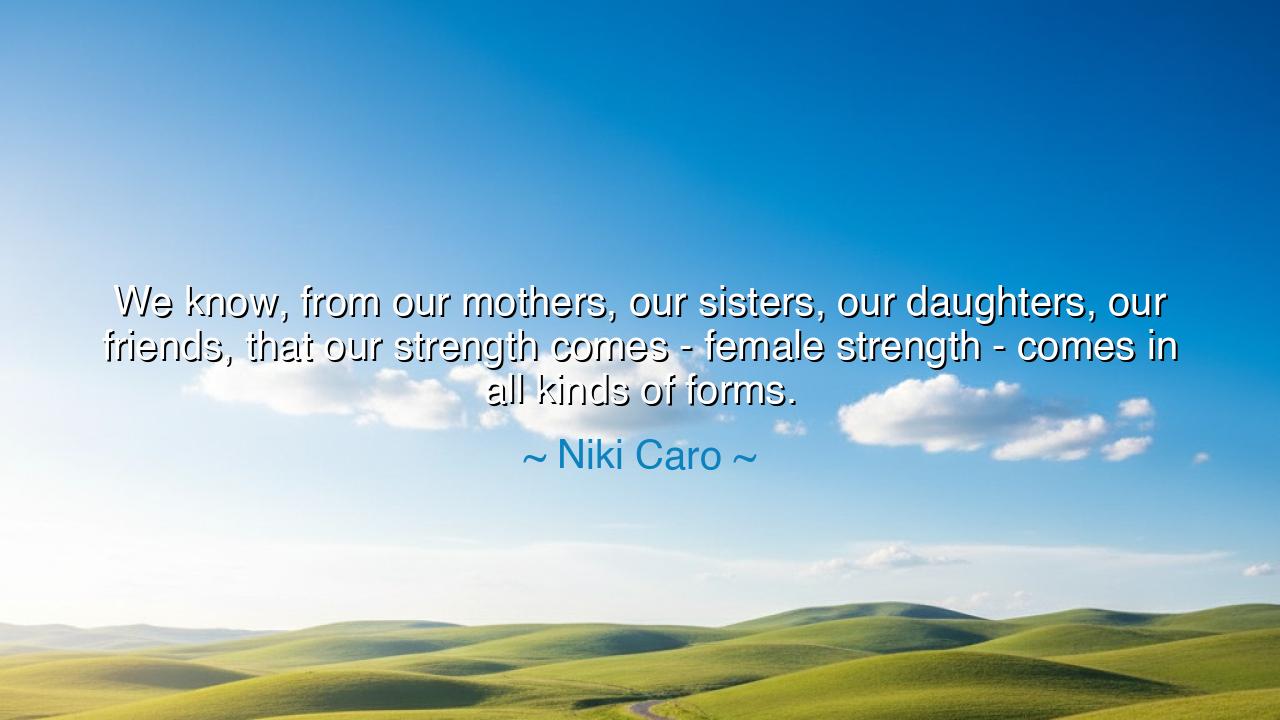
We know, from our mothers, our sisters, our daughters, our
We know, from our mothers, our sisters, our daughters, our friends, that our strength comes - female strength - comes in all kinds of forms.






Niki Caro declared with reverence and clarity: “We know, from our mothers, our sisters, our daughters, our friends, that our strength comes—female strength—comes in all kinds of forms.” These words are both a recognition and a reminder: that the power of women is not singular, nor bound by one mold, but as diverse as the tides of the sea and as enduring as the roots of the earth. It is not brute force alone, nor soft tenderness alone, but a weaving together of countless forms of resilience that sustain families, communities, and civilizations.
From the ancients we see this truth reflected. In Greece, they honored Demeter, the goddess of the harvest, whose quiet, nourishing strength sustained the land. Yet they also revered Athena, whose wisdom and courage guided warriors into battle. Both feminine, both powerful, but in very different ways. Caro’s words echo this same eternal truth: female strength is not a single flame but a constellation of lights, each shining with its own kind of power.
We know this also from the lives of real women who shaped history. Consider Harriet Tubman, who through courage and cunning led slaves to freedom, risking her life again and again. Her strength was fierce and defiant. Contrast this with Florence Nightingale, whose strength was not in the battlefield, but in the sickroom, nursing the wounded and bringing order to chaos. Both were women, both strong, yet their strength took utterly different forms. Caro’s words remind us to see all these forms as valid, vital, and sacred.
Her mention of mothers, sisters, daughters, and friends points us to the personal, not only the historical. Every life is touched by women who bear their own forms of strength. The mother who endures long nights for her child. The sister who stands in defense of her kin. The daughter who brings new hope to the family line. The friend who gives counsel and comfort in moments of despair. These are not acts sung by poets or carved in marble, yet they are no less mighty, for they uphold the very fabric of daily life.
And let us not forget that female strength is not opposed to men but flows through them as well. Men are shaped by the strength of women around them—by their mothers, their partners, their daughters, their teachers. Just as steel is tempered by fire, so too is the soul of man tempered by the presence of strong women. Caro’s reminder calls us not to diminish men, but to acknowledge the balance of human strength in all its forms.
The lesson here is clear: do not limit your understanding of strength to what the world too often praises—loudness, domination, or physical might. See instead the quiet endurance, the creative force, the patient wisdom, and the nurturing power that women embody. Each is a form of strength, and each is necessary. To ignore them is to cripple society; to honor them is to make it whole.
Therefore, let Caro’s words be carried down as teaching for generations: female strength is many-faced, many-formed, and infinite. Cherish it in your mothers, celebrate it in your sisters, nurture it in your daughters, and honor it in your friends. And in your own life, whether you are man or woman, recognize that strength wears many garments. Be not blind to it, nor dismissive of it, but hold it in reverence. For only when all forms of strength are acknowledged will humanity itself stand unbroken, whole, and enduring.






AAdministratorAdministrator
Welcome, honored guests. Please leave a comment, we will respond soon